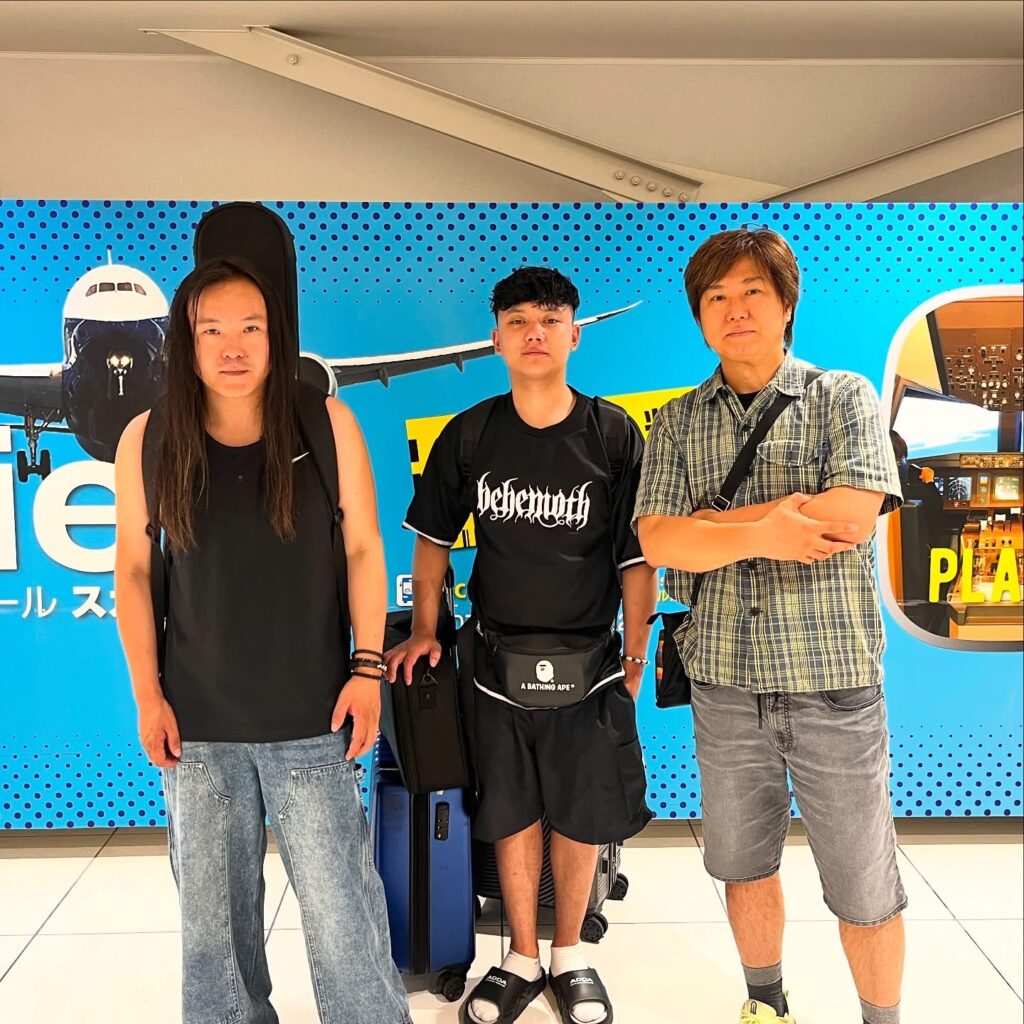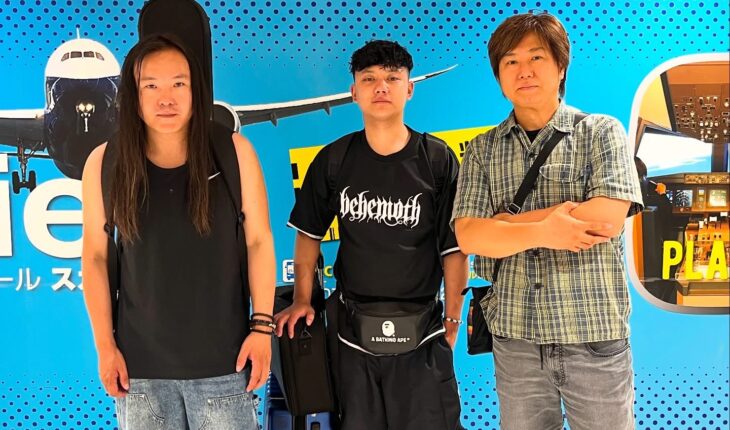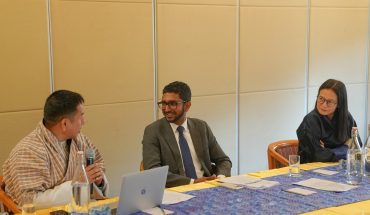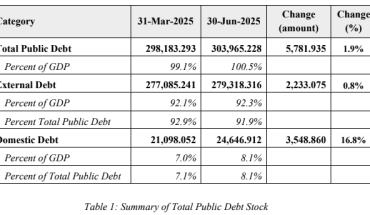
Bhutanese grunge band NorthH heads to Japan
KINZANG DORJI TSHERING
Thimphu
One of the country’s most dedicated grunge rock bands is on a tour of Japan — a nation revered for its vibrant and technically advanced rock culture.
With six shows lined up across multiple venues, the group will soon take the stage in front of international audiences, showcasing a sound developed far from the glittering lights of major music cities.
The band is fronted by Ugyen, who serves as both lead guitarist and vocalist, and backed by Rabi on drums, forming a core that has kept the group musically grounded.
Their upcoming Japan tour marks not only an important chapter in their career but also a symbolic moment for Bhutanese rock as a whole — a genre often overshadowed by the rise of pop and hip-hop within the local music landscape.
Ugyen said: “This is a huge deal for us. When I first formed the band back in 2014, my biggest dream was to perform in Japan within 10 years. It’s been a long journey, but we’ve finally made it.”
Interestingly, the opportunity to tour Japan didn’t come through management deals or international agents, but rather from a chance encounter during the band’s tour of Bangkok in either 2018 or 2019. Ugyen recalls performing at a venue where both a Japanese rock fan and a Japanese band were present.
“They saw us perform, and we instantly connected through music,” Ugyen recalled. “The Japanese band member liked our sound, and after returning to Japan, he helped us get in touch with people, venues, and organizers.”
That connection planted the seed for what would later become a six-show Japan tour. It’s a story that captures the spirit of grassroots rock — built not through industry deals, but through passion, performance, and word-of-mouth.
For Ugyen, Japan is not just another tour destination. It represents the beating heart of Asia’s rock culture.
“We consider Japan the most happening place in Asia when it comes to rock music. They have the highest number of rock bands doing well internationally, and their audiences are serious about live music,” he said.
But with that excitement comes pressure. The band will be performing alongside experienced Japanese acts with years of touring and sophisticated production experience under their belts.
“Musically, it’s going to be very challenging,” Ugyen admitted. “Japanese bands are technically sound and equipped with top-tier gear. We don’t know exactly what the audience expects from us, since this will be our first performance there. But we’ll give it our best. We want to match the energy and quality of those bands — if not exceed them.”
The band didn’t start out with a fixed genre. Like many young musicians, they began with cover songs — playing anything they liked, without defining their style.
But as the years progressed and their musicianship matured, they discovered grunge — a genre known for its raw guitar riffs, gritty vocals, and emotional weight.
“We didn’t really know our sound at first. We were just a rock band,” said Ugyen. “But eventually, we gravitated toward grunge. We found that crunch and heaviness appealing. Since then, all our original songs have been within that genre.”
Their songwriting focuses heavily on the musicality of the genre — guitar riffs, bass grooves, and drum fills — before lyrics are even added. “We want our songs to sound grunge. We work hard on the structure, so it’s not just random chords and lyrics. The music has to feel right first.”
Amidst a global shift toward digital music production and computer-based arrangements, Ugyen remains steadfast in his belief that live instrumentation is the soul of real music.
“I just hope people continue to focus on real instruments and don’t fully depend on technology to create music,” he said. “I’ve seen some people do lip-syncing or use software-generated sounds. That’s not what music should be about.”
He added: “We play everything ourselves — our guitars, our drums, bass, and vocals. What you hear on the recordings is what you get on stage. That’s something we really take pride in.”
His hope is to inspire younger Bhutanese musicians to follow a similar path — to get their hands on real instruments and create music that breathes through performance, not software.
Despite the rise of other genres, Bhutan still has a small but passionate rock audience. Ugyen acknowledges the challenges of sustaining a rock career in a country where pop and hip-hop dominate.
“Rock is almost dead, you could say,” he admitted. “But we still see many good bands coming up, especially on weekends. There are groups performing in pubs and clubs, and that’s encouraging. The audience is small, but they’re loyal. And that’s why we keep going.”
For the band, connecting with international audiences is not just a goal — it was a founding principle. “From the start, our dream was to perform outside Bhutan. We wanted to show that even in Bhutan, we have rock bands. That’s why this Japan tour is so important to us.”
While the band’s music is predominantly in English, they have begun experimenting with Dzongkha — Bhutan’s national language.
“Ninety-nine percent of our songs are in English,” said Ugyen. “But we do have one Dzongkha song called ‘My D.’ Fans in Bhutan love it and sing along, which is amazing. Personally, I feel I can express more in English, but Dzongkha has its place.”
The band recently released Milum, which Ugyen described as possibly the first Dzongkha grunge song. “We’re working on more songs in Dzongkha. It’s a bit challenging since no one’s done this in our genre before, but we’re excited to keep exploring it.”
As for incorporating Bhutanese instruments or sounds, Ugyen said it’s not part of their current music, but it’s something they’re considering for the future.
“We just use guitars, drums, and bass right now — no traditional instruments yet. But we’d love to include them someday and make our music more culturally rooted.”
As they prepare for their Japan debut, Ugyen and Rabi are not just carrying instruments — they’re carrying years of perseverance, self-discovery, and commitment to authentic music-making.
In a world increasingly flooded with digital shortcuts and algorithm-driven trends, their message is refreshingly simple: real music still matters.
“We’re really looking forward to seeing real musicians on stage,” Ugyen said. “This tour is not just for us — it’s for everyone back home who believes in the power of live music.”





